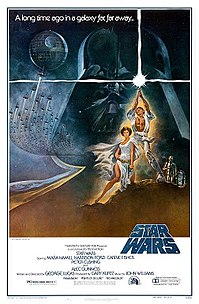
Much has been made over the years of "strong women" in science fiction and fantasy and how they serve to elevate the genres and to promote an empowered view of women. I'm all for this, but when I think of science fiction and fantasy films, the first thing to pop into my head is Star Trek which elevated the time-honored role of demure, but leggy secretary to that of starship yeoman... one small step backwards indeed.
But are the weaker women of F&SF all negative stereotypes? I guess it depends on how you see "weak." One of my favorite science fiction women is Princes Leia whose combination of damsel-in-distress, love interest and wise-cracking heroine shaped my early impression of the paradox embodied in Hollywood's leading ladies. Later, I would discover that this paradox was part of the recipe for success in films like Superman, which featured a Lois Lane modeled almost directly on Leia's insecure-but-in-command mashup. Even moreso than Leia, Lois felt lost without her leading man, but in every other way she was in command of her life. It's as if men were her kryptonite, transforming the business woman of steel into a helpless schoolgirl. Again and again the 80s re-cast this new kind-of-super-woman in a variety of science fiction and fantasy. Karen Allen rounds out what I consider to be the top-3 in this lineup with Marion Ravenwood, the once-and-future lover of one Henry "Indiana" Jones.
Not all of Hollywood's weaker sex lead such double lives however. There's something fascinating to me about the noir flashbacks that maintain a cool dignity, while letting the leading man solve all of their problems. In Blade Runner, the replicant Rachel isn't even human, which might actually work to her advantage in this role.
Then we come to the younger characters who we might believe are being molded into strong women, but oscillate back and forth during the film. Labyrinth's Sarah, played by a young Jennifer Connelly, is bounced around like a pinball for most of the film's duration until she learns to take over and tell her fantasy world what to do. This would be a running theme in The Princess Bride and several other genre films.
An odd twist (and one that I'm sure isn't universally appreciated) is the reverse Labyrinth. This sort of film features a strong an independent young woman who finds that she must yield to her stereotype in order to get her man (and presumably the life she truly wishes to lead...) Oddly enough I've enjoyed the prime example of this type, Pleasantville. There's something irresistible about that film, and I found myself rooting for Reese Witherspoon's character throughout her transformation.
These films collectively demonstrate not just Hollywood's fascination with women who aren't exactly independent, but fandom's as well. Every one of these films were nominated for a Hugo Award for Best Dramatic Presentation, and several of them won. Still, none of these films draped their leading lady over a motorcycle in cutoff jeans. There are, after all, always lines to be crossed...
Maybe you should consider the role of the Companions to Dr.Who, and I mean the new seasons, whose role ranges from emotional saviour, damsel in distress, heroine, and sometimes the equal of a brilliant, god-like man. I suppose you have a point with the portrayal of the hollywood 'weaker sex'as not neccesarily being negative but I don't come away from Pleasantville thinking I want to be like Reece Witherspoon's character- or Buttercup the princess bride. Give me Samantha Carter or Teyla Emmagan any day- not to mention Xena the warrior princess. It's just an old formula that is evolving.
ReplyDelete